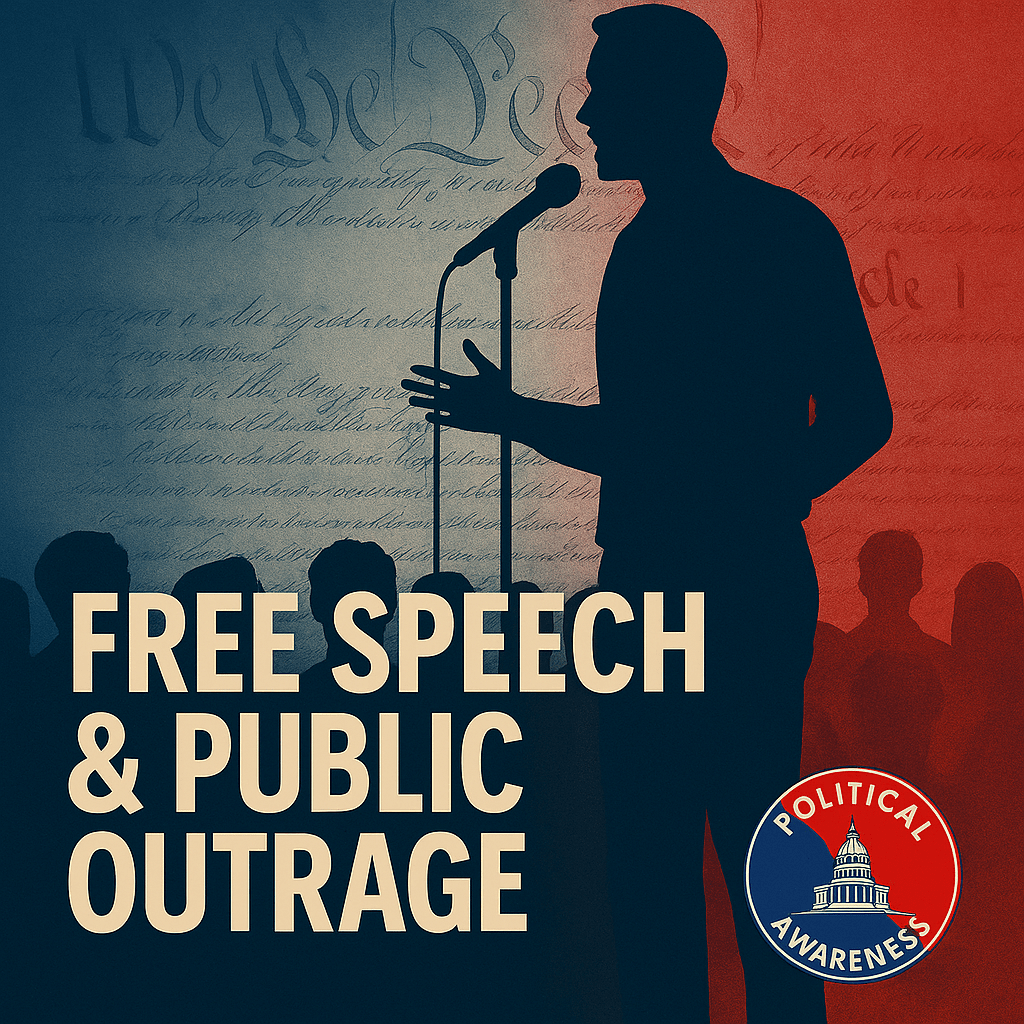Note: Political Awareness’s published communication is never authorized by any candidate or their committees.
First Amendment Rights: Why So Many People Were Upset About Jimmy Kimmel
Jimmy Kimmel’s controversy highlights widespread misconceptions about the First Amendment. Explore why free speech matters, what it truly protects, and why America’s cultural divide threatens its most cherished right.
In 2025, few late-night hosts command as much attention as Jimmy Kimmel. Known for mixing sharp political commentary with celebrity humor, Kimmel has carved out a place as both entertainer and provocateur. Yet his jokes and monologues often spark waves of outrage, online petitions, and demands for him to be fired.
The most recent controversy illustrates the enduring tension in American democracy: the divide between what the First Amendment protects and what the public believes it ought to cover. Millions of Americans were upset about Kimmel not only because of what he said but because of the misunderstanding about what free speech means in practice. This uproar is more than entertainment gossip. It is a window into the fragile state of civic literacy, the hyper-polarization of culture, and the challenges of balancing free expression with social accountability.
The First Amendment of the United States Constitution is clear in its intent but often misunderstood in its application:
“Congress shall make no law… abridging the freedom of speech, or of the press…”
At its core, the amendment restricts government power. It ensures that citizens cannot be jailed, fined, or censored by the state for expressing their views. But it does not insulate anyone from criticism, consequences in the private sector, or the social backlash that often accompanies controversial speech.
Many of Kimmel’s critics believe free speech means freedom from consequences. When his monologues upset large groups of Americans, demands for ABC to cancel his show or advertisers to withdraw support surface almost instantly. Supporters of these campaigns often argue that his speech should be “punished.” Yet constitutionally, there is no violation unless the government intervenes.
Why do comedians like Kimmel trigger such intense emotions? Part of the answer lies in the platform. Late-night television is not merely entertainment; it is one of the most visible stages for social commentary. When Kimmel makes a pointed joke about a political leader or mocks cultural values, it reaches millions of homes.
Celebrities wield disproportionate influence in shaping public discourse. That influence makes their speech feel heavier, more consequential, and more offensive to those who disagree. In a polarized America, where media is often filtered through partisan lenses, every punchline becomes a potential flashpoint.
The Kimmel uproar also reflects a larger debate about free speech in the 21st century. On one side are those who insist that individuals should face consequences for harmful or offensive remarks, particularly when they reinforce systemic inequalities. On the other side are those who argue that “cancel culture” represents an authoritarian attempt to silence dissent and enforce ideological conformity.
To understand the stakes, it helps to place the Kimmel debate in historical context. America has long wrestled with the tension between free expression and public outrage:
– Lenny Bruce, the trailblazing comedian of the 1960s, was arrested multiple times for obscenity. His career was ruined by legal battles, yet today he is celebrated as a martyr for free speech.
– The Dixie Chicks faced boycotts and blacklisting after criticizing President George W. Bush in 2003. They were not censored by the government but were punished by the marketplace of public opinion.
– Colin Kaepernick became one of the most divisive athletes in American history for kneeling during the national anthem. His protest was protected speech, yet it cost him his NFL career.
Each of these cases demonstrates that free speech does not guarantee freedom from social or professional consequences. Kimmel’s case is less severe — he continues to host his show — but the pattern is the same: a cultural clash over what kinds of expression are tolerable in the public square.
Some may dismiss the Kimmel controversy as late-night drama, unworthy of serious attention. But the intensity of the public’s anger reveals a deeper problem: the erosion of shared understanding about the rules of democracy.
At a time when democracy itself is under strain, misunderstandings of foundational rights are dangerous. If Americans cannot agree on what the First Amendment protects, they risk weaponizing the concept in partisan battles. That undermines both the principle of free expression and the possibility of constructive dialogue.
What can be learned from this recurring cycle of outrage? A few key lessons stand out:
1. Civic literacy is essential. Citizens must understand that the First Amendment protects against government censorship, not criticism from other citizens or corporations.
2. Criticism is not censorship. When audiences voice disapproval of Kimmel, they are exercising their own free speech rights. The line is crossed only when government action silences dissent.
3. Comedy is political. Satire has always been a tool for exposing hypocrisy and challenging the powerful. Demanding that comedy remain apolitical misunderstands its role in democratic life.
4. Democracy requires tolerance. Tolerating offensive or disagreeable speech does not mean endorsing it. It means recognizing that a diverse society cannot exist without protecting expression that offends some while empowering others.
The outrage over Jimmy Kimmel is not really about him. It is about us — about how Americans understand their rights, about how polarized our culture has become, and about whether we can still tolerate differences without resorting to silencing each other.
The First Amendment remains the cornerstone of American democracy, but its power lies not just in law. It lies in the willingness of citizens to protect the principle of free expression, even when the speech in question makes them uncomfortable.
Jimmy Kimmel’s jokes may fade from memory, but the reactions they sparked are a reminder: free speech is easy to defend when we agree with it. The true test comes when we don’t.


Leave a Reply